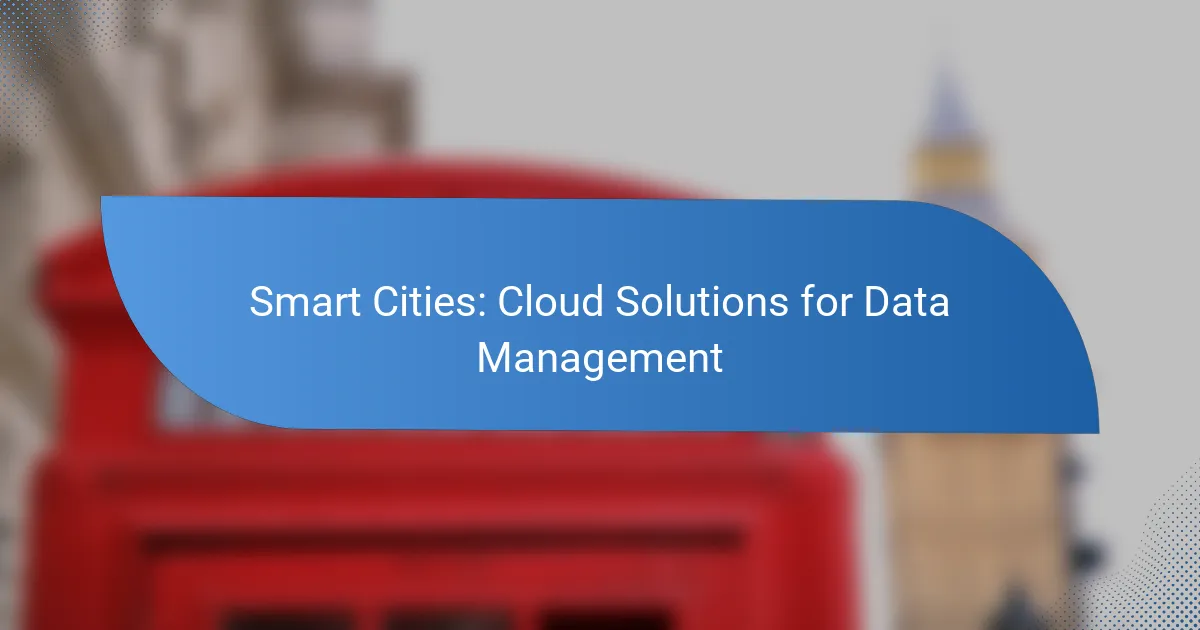Smart cities leverage cloud solutions to optimize data management, enabling efficient collection, processing, and analysis of vast amounts of urban data. By utilizing cloud-based technologies, cities can enhance decision-making and improve services through real-time analytics, secure data storage, and seamless integration with existing systems.
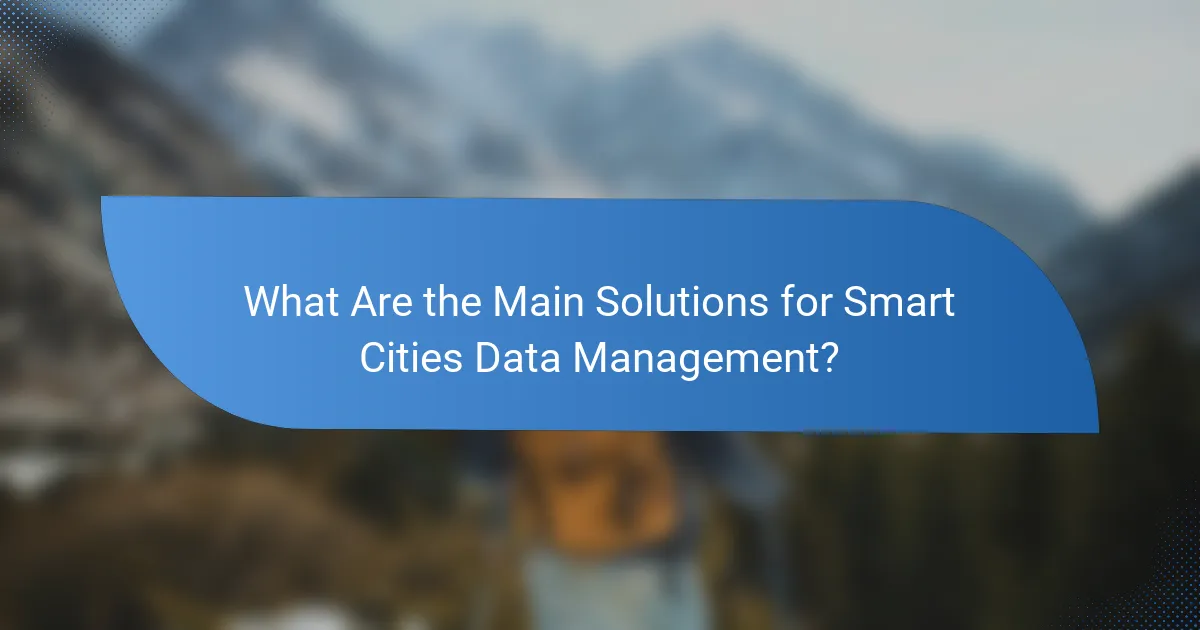
What Are the Main Solutions for Smart Cities Data Management?
Smart cities utilize various solutions for effective data management, focusing on cloud technologies to enhance efficiency and decision-making. Key solutions include cloud-based data analytics, IoT integration platforms, real-time data processing, data visualization tools, and secure data storage options.
Cloud-Based Data Analytics
Cloud-based data analytics enables smart cities to process vast amounts of data collected from various sources, such as sensors and devices. This approach allows for scalable data processing and the ability to derive insights without heavy local infrastructure investments.
Consider platforms like AWS or Google Cloud, which offer analytics services that can handle data from multiple city operations, including traffic management and energy consumption. These services often provide built-in machine learning capabilities to enhance predictive analytics.
IoT Integration Platforms
IoT integration platforms serve as the backbone for connecting various devices and sensors within a smart city. These platforms facilitate seamless communication and data exchange between devices, enabling real-time monitoring and control.
Examples include Microsoft Azure IoT and IBM Watson IoT, which allow cities to manage everything from public transportation systems to environmental sensors. When selecting a platform, consider compatibility with existing systems and scalability for future growth.
Real-Time Data Processing Solutions
Real-time data processing solutions are crucial for smart cities that require immediate insights from data streams. These solutions enable cities to respond quickly to events, such as traffic congestion or emergency situations.
Technologies like Apache Kafka and AWS Kinesis allow for the ingestion and analysis of data in real time. Cities should assess their processing needs and choose solutions that can handle high data volumes with low latency, typically in the range of milliseconds.
Data Visualization Tools
Data visualization tools help stakeholders understand complex data through graphical representations. These tools are essential for making data-driven decisions in smart cities by highlighting trends and patterns.
Popular options include Tableau and Power BI, which can create interactive dashboards for city planners and officials. When implementing these tools, ensure they integrate well with existing data sources for a comprehensive view of city operations.
Secure Data Storage Options
Secure data storage options are vital for protecting sensitive information collected by smart city systems. These solutions must comply with data protection regulations and ensure data integrity and confidentiality.
Cloud storage providers like AWS and Azure offer robust security features, including encryption and access controls. Cities should evaluate their data storage needs, considering factors like data volume, access frequency, and regulatory compliance, to choose the right storage solution.
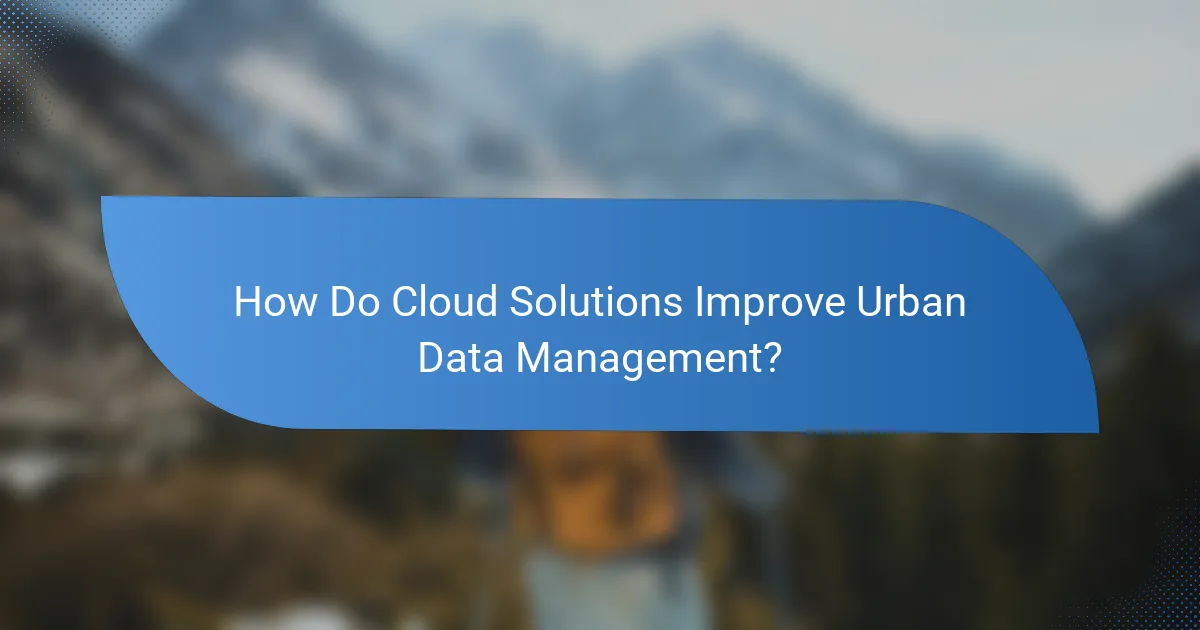
How Do Cloud Solutions Improve Urban Data Management?
Cloud solutions enhance urban data management by providing centralized platforms for data storage, processing, and analysis. This allows cities to efficiently collect, manage, and utilize vast amounts of data from various sources, leading to better decision-making and improved services.
Enhanced Data Accessibility
Cloud solutions improve data accessibility by enabling authorized users to access information from anywhere with an internet connection. This is crucial for city planners and emergency responders who need real-time data to make informed decisions.
For example, urban traffic data can be accessed by city officials on mobile devices, allowing them to respond quickly to congestion or accidents. Additionally, cloud platforms often support data sharing among departments, fostering collaboration and transparency.
Scalability for Growing Data Needs
Cloud solutions offer scalability, allowing cities to expand their data storage and processing capabilities as their needs grow. This flexibility is vital for urban areas experiencing rapid population growth or increased data generation from IoT devices.
Many cloud providers offer tiered services, enabling cities to start with basic plans and upgrade as necessary. This means cities can avoid large upfront investments in infrastructure while still accommodating future data demands.
Cost Efficiency in Data Operations
Utilizing cloud solutions can lead to significant cost savings in urban data operations. By reducing the need for physical servers and maintenance, cities can allocate resources more effectively.
Moreover, cloud services typically operate on a pay-as-you-go model, allowing municipalities to only pay for the resources they use. This can result in lower operational costs compared to traditional data management systems, especially for smaller cities or those with limited budgets.

What Are the Key Features of Cloud Solutions for Smart Cities?
Cloud solutions for smart cities are designed to enhance data management through scalability, flexibility, and real-time analytics. Key features include interoperability with existing systems, advanced security protocols, and user-friendly interfaces that facilitate seamless integration and usability.
Interoperability with Existing Systems
Interoperability ensures that cloud solutions can communicate effectively with current infrastructure and applications used in smart cities. This feature is crucial for integrating various data sources, such as traffic management systems, public safety networks, and utility services.
To achieve interoperability, consider using standardized protocols like MQTT or RESTful APIs. These standards allow different systems to exchange data smoothly, reducing the need for extensive reconfiguration or replacement of legacy systems.
Advanced Security Protocols
Advanced security protocols are essential to protect sensitive data in smart cities. These protocols include encryption, multi-factor authentication, and regular security audits to safeguard against cyber threats.
Implementing security measures such as end-to-end encryption can help ensure that data remains confidential during transmission. Additionally, adhering to standards like ISO 27001 can guide cities in establishing robust security frameworks.
User-Friendly Interfaces
User-friendly interfaces are vital for ensuring that city officials and residents can easily access and utilize data from cloud solutions. Intuitive dashboards and mobile applications can enhance user experience and engagement.
When designing these interfaces, prioritize simplicity and clarity. Features like customizable views and real-time updates can help users quickly interpret data and make informed decisions, ultimately improving city management and services.
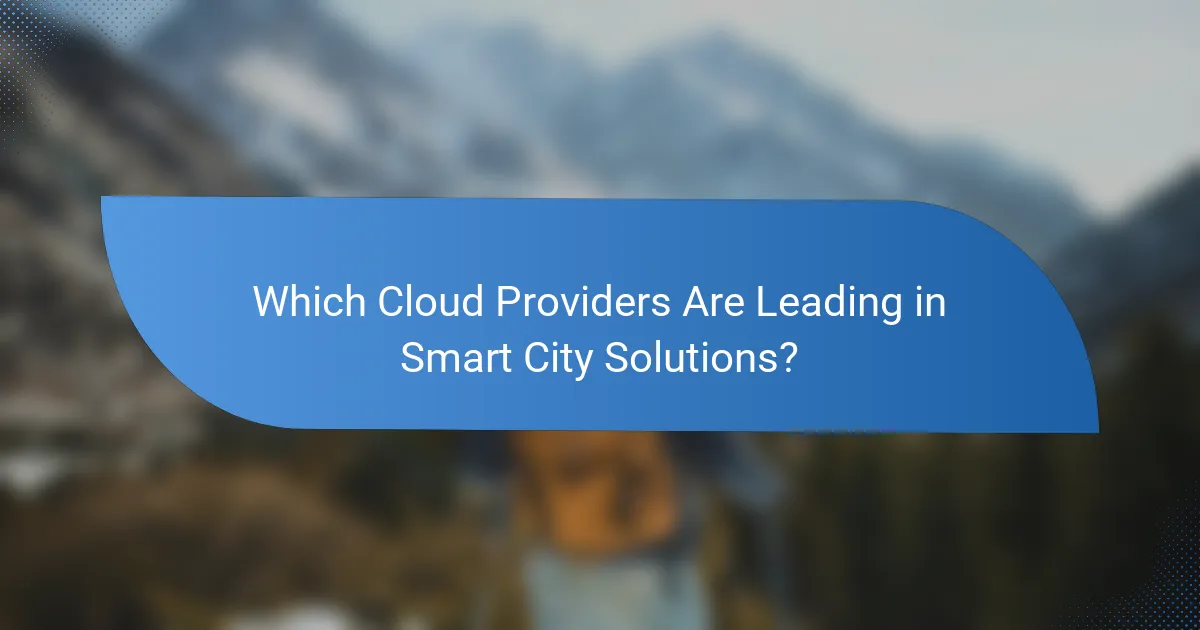
Which Cloud Providers Are Leading in Smart City Solutions?
Amazon Web Services (AWS), Microsoft Azure, and Google Cloud Platform are the top cloud providers driving smart city solutions. Each offers distinct features and capabilities tailored to manage urban data effectively, enhancing city infrastructure and services.
Amazon Web Services (AWS)
AWS provides a comprehensive suite of services that cater to the needs of smart cities, focusing on scalability and flexibility. Its IoT Core allows cities to connect devices securely, while services like AWS Lambda enable real-time data processing without server management.
For example, cities can use AWS to analyze traffic patterns and optimize public transport schedules. Additionally, AWS’s global infrastructure ensures low-latency access to data, which is crucial for time-sensitive applications.
Microsoft Azure
Microsoft Azure stands out with its strong integration capabilities and advanced analytics tools. Azure IoT Hub facilitates device management and data collection, while Azure Machine Learning helps cities predict trends and improve decision-making.
Cities can leverage Azure’s capabilities to monitor air quality and manage energy consumption efficiently. The platform also supports compliance with local regulations, making it easier for municipalities to adopt smart solutions.
Google Cloud Platform
Google Cloud Platform (GCP) excels in data analytics and machine learning, providing tools that help cities derive insights from large datasets. GCP’s BigQuery allows for fast querying of massive data sets, which is essential for urban planning and resource allocation.
For instance, cities can use GCP to analyze public safety data and enhance emergency response strategies. GCP’s commitment to sustainability also aligns with many cities’ goals to reduce their carbon footprint and improve environmental outcomes.
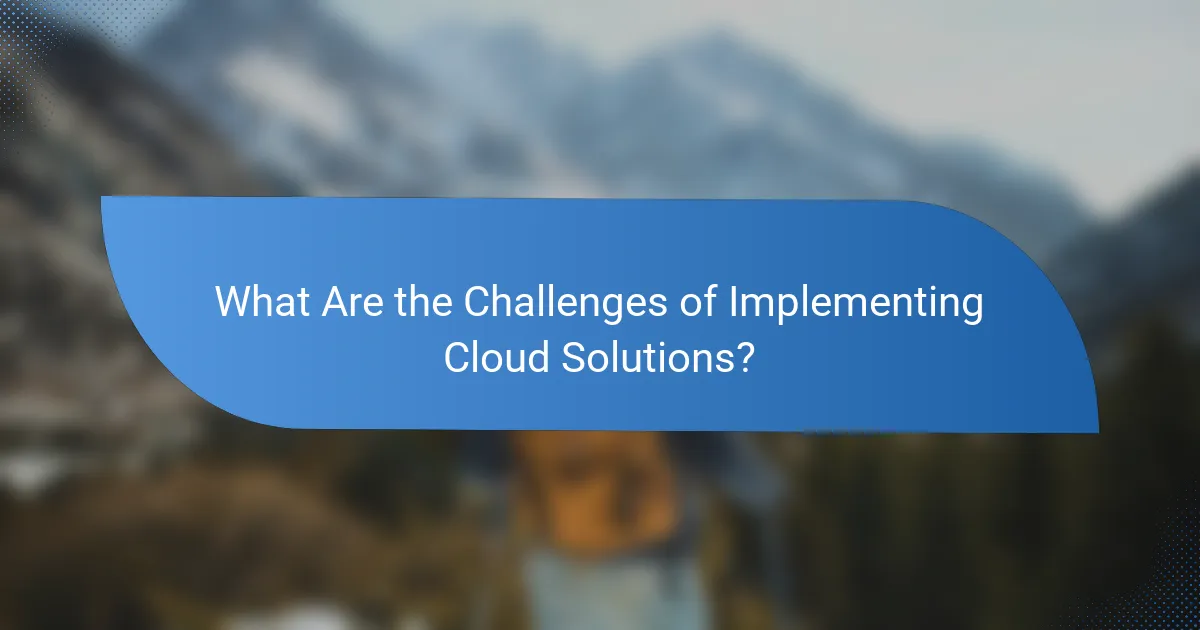
What Are the Challenges of Implementing Cloud Solutions?
Implementing cloud solutions for data management in smart cities presents several challenges, including data privacy concerns, integration with existing legacy systems, and the cost of migration. Addressing these issues is crucial for successful deployment and operation.
Data Privacy Concerns
Data privacy is a significant challenge when adopting cloud solutions, especially in smart cities where vast amounts of personal and sensitive information are collected. Ensuring compliance with regulations such as GDPR in Europe or CCPA in California is essential to protect citizen data.
To mitigate privacy risks, cities should implement robust encryption methods and access controls. Regular audits and transparency in data handling practices can also help build public trust.
Integration with Legacy Systems
Integrating cloud solutions with existing legacy systems can be complex and time-consuming. Many smart cities rely on older technologies that may not easily connect with modern cloud platforms, leading to potential data silos and inefficiencies.
A phased approach to integration, starting with less critical systems, can help identify compatibility issues early. Utilizing middleware solutions can facilitate smoother transitions and data flow between old and new systems.
Cost of Migration
The cost of migrating to cloud solutions can vary widely, influenced by factors such as the size of the data, the complexity of existing systems, and the chosen cloud provider. Cities should budget for both direct costs, like software and infrastructure, and indirect costs, such as training staff.
To manage expenses, consider a gradual migration strategy that allows for spreading costs over time. Additionally, exploring public-private partnerships can help alleviate financial burdens while enhancing service delivery.
